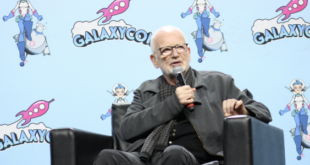Dr. Gregory House wakes up in bed after making love to Dr. Lisa Cuddy after the “cut” in last week’s House episode “Under My Skin.” Cuddy is gone, but not the memory, as House finds her lipstick sitting on his bathroom sink. He smiles, noting the lipstick smear on his face, the happy recollection of their ardent lovemaking. He pockets the lipstick, noting its color, with clearly a fondness for it: a talisman and a symbol of what lies ahead for the clean and sober House and love finally kindled after seasons of sparring and sparking.
House’s cruel mocking of Cuddy’s motherhood last week transformed into a cry for help, stopping her in her tracks as she stalks angrily from his presence. His tearful confession that he is hallucinating stuns her as much as his plea — that desperate plea that he needs her. Ever House’s guardian angel, Cuddy ignores House’s hurtful words and, anger forgotten, she takes him home, sits with him as he goes through the unrelenting agony of Vicodin detox, holds his hand, caresses his sweaty brow and calms his nerves and stomach with ginger tea. And in the morning she gives him an even greater gift. A 20-year-old secret — an inkling that she’s loved him for all these years; that he’s not simply the Buraku of Princeton Plainsboro Teaching Hospital. Not just a hospital asset. She has always liked that “interesting lunatic — for who he is, not for what he does for the hospital. And then asks him: do you want to kiss me? And in his heart of hearts, he is honest: “I always want to kiss you.” A gentle brushing of the lips deepens into passion for them.
Singing as he enters his office the next day, still holding onto Cuddy’s lipstick, House is in a spectacular mood. Not just for having sex, but for having won Cuddy. “Zing, zing, zing went my heart strings… the moment I saw her, I fell.” The sappy lyrics of a 1940s Irving Berlin tune tells us that he’s in love, much as in season two, House’s night with Stacy in “Need to Know,” inspired him to sing a sappily romantic aria from the Romberg operetta The Student Prince.
It’s a nice story, filled with the promise of love and redemption. Hope and happiness. “This is the story you made up about who you are. It’s a nice story,” House hears Amber say in his ear. But as Kutner’s grave image tells House at the end of last night’s season finale “Both Sides Now,” “too bad it isn’t real.”
What will stay with me the entire summer will be House’s horrified and then shell-shocked face with the dawning recognition that the entire experience with Cuddy has been a delusion. Everybody lies, goes House’s mantra. But the lie his own brain constructed is the cruelest of all.
No longer able to distinguish reality from illusion, House confabulates a fantasy that did not render him isolated and alone in his apartment, his life falling apart. What line was crossed in House’s mind that caused it to snap? Had he reached the same level of despair that Kutner had weeks before? That moment where the line between living and dying in misery blur? House’s mind made a choice, and he could just as easily have committed suicide, as Kutner had in “Simple Explanation.” But, instead, his mind chose the comfort of Cuddy’s healing sensuality; the warmth of her body, and the belief that he could be happy.
The heartbreaking revelation that it was all a delusional fantasy is as heartbreaking as it gets. No, Cuddy never went home with him, instead stalking angrily from the room after he mocks her cruelly. He never confesses that he’s hallucinating; she never turns back into the room to comfort him.
Instead he goes home, spending the night alone, in despair still hallucinating and unable to stop himself from the continued downward spiral. His support systems gone, House sinks further, his mind creating the fantasy that he is both loved and redeemable, two things that have always been beyond his belief. The final scene between House and Cuddy nearly parallels his imagined night of detox as Cuddy forgets her anger, replacing it with concern, support, and love as House begins to realize that he is no longer simply suffering hallucinations, but full-blown delusions.
“Are you alright?” she inquires, worried as House, who is visibly shaken, nearly collapses into the wall. But House barely hears her as his mind tries to sort reality from illusion. House’s halting “No, I’m not okay,” finally realizing the cruel trick played on him by his own mind, has been months coming. House has been headed for emotional collapse since the end of last season. As guarded as House is, neither Cuddy nor Wilson saw it coming. Were there clues they might have picked up on? Things they might have done to mitigate House’s deteriorating mental state? Was it drugs, or something else? What did they miss? I’m reminded of House’s words to the patient’s husband in season two’s “Forever.” He tells that no one can go so far off the deep end without someone noticing.
What a way to end the season. The man who has stood on a ledge for five years has suddenly, tragically (and metaphorically), finally jumped and right down into the rabbit hole. “Both Sides Now” takes the year of unrelenting emotional and physical trauma endured by its central character to its logical conclusion. A very, very bleak ending to an intense, downbeat season. Hugh Laurie gave yet another raw, brave, and gut-wrenching performance. If he does not win the Emmy this year (and I mean it!) there is no justice. At all. Really.
Doris Egan’s complex script (more about that later in the week) plays with the concept of self-perception. Who we are? What makes us… us? How much of it is wishful thinking, a slightly deluded perception of who we might be; and how much is the reality? Our emotional well-being relies on us being able to tell the difference between the two.
This week’s patient, Scott, has undergone surgery on his corpus callosum that stopped his seizures, but destroyed communication between the left (rational) and right (aesthetic) parts of his brain. In his case his left brain doesn’t like what his right brain is doing. And the miscommunication between them leads to something called alien hand syndrome, causing his left hand to do what it wants, when it wants, consequences be damned.
House calls the right brain the brain irrelevant, yet (as Foreman points out) House’s insights and intuition likely stem from that half of his brain (not to mention at least half of his musical gift). The left brain does the math, analyzes the parts. It’s the logician: rational, analytical. It is the most obvious part of House’s personality. The right brain is intuitive, holistic, random and subjective. And without it, House would never be able to synthesize or imagine. He dismisses it because it’s his most fragile part: his creativity, his romanticism, his love of music and art. It reveals him, therefore it must be suppressed.
And in the midst of all this sadness, Cameron and Chase marry in a beautiful ceremony intercut with House’s journey toward his own uncertain future. It is poignantly ironic that House, understanding Cameron’s fears and advising her to take a chance on happiness, saves her relationship with Chase, as his own possibility for happiness evaporates like a mirage in the desert. The beautiful and haunting melody of the Rolling Stones “As Tears Go By” (and probably my favorite Stones song ever) gives the illusion of a love song. But the lyrics are starkly evocative of where House’s life now stands as he travels the long road to the Mayfield Psychiatric Hospital: “My riches can’t buy everything/I want to hear the children sing/All I hear is the sound/Of rain falling on the ground/I sit and watch as tears go by.” No wonder I wept at the end of this stunning finale to a great season.
What does the future hold for House? We’ll have to wait till September to find out.
And I cannot finish this review without saying something about Carl Reiner. He’s 86 years old and still brilliant and funny as hell. I will have much more to say about the episode and all of its complexities later in the week after I’ve had the opportunity to talk about it with writer Doris Egan.
Thanks David Shore, Katie Jacobs, all the writers and directors, cast, and especially the magnificent Hugh Laurie for making this season as powerful as it gets. Thank you to all my loyal readers who have made this column such an enjoyable experience and a great success. I will continue writing through the summer and as promised, later in the week, please look for my exclusive one-on-one interview with the finale’s writer, House co-executive producer Doris Egan.
 Blogcritics The critical lens on today's culture & entertainment
Blogcritics The critical lens on today's culture & entertainment



